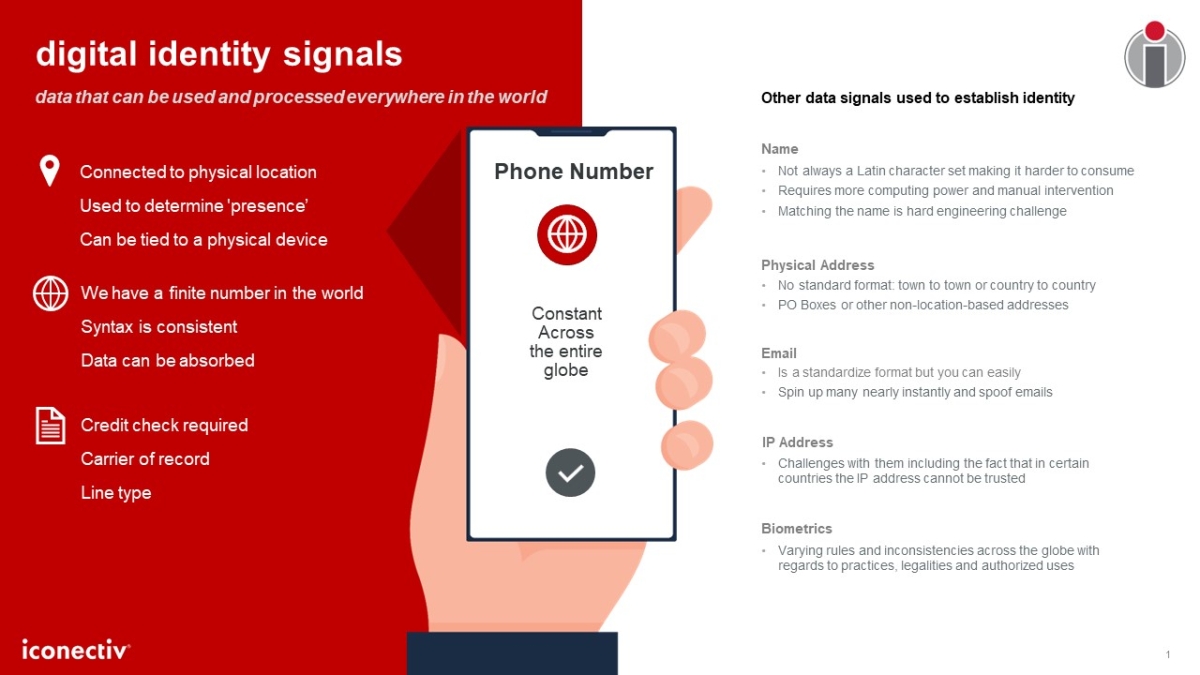
Not all digital identity signals are created equal
To prevent fraud and mitigate risk of online crime, identity verification is imperative, and there are six primary attributes that can be leveraged to authenticate and verify one’s digital identity: name, physical address, email address, IP address, biometric data and phone numbers. While these are all used by communication service providers (CSPs), banks and other corporations to verify a customer’s identity, the varying pros and cons of each one’s certifiability make some better choices than others:
- Name: While your name may make you feel like one of a kind, in the world of authorization and fraud prevention, that is not the case. Not only can there be multiple people with the same name, but some names also contain symbols (apostrophes, dashes, etc.) from the Latin character set that the digital realm won’t accept or can’t understand. This makes the information harder for a computer to take in and match with their records, requiring further engineering and manual work, wasting time and money. Names are also prone to misspelling by third parties.
- Physical address: Mailing addresses are also not up to the challenge of consistent digital identity verification. Aside from also appearing in varying character sets, addresses have no standard format, varying from country to country. Additionally, non-location-based addresses, such as PO boxes, can be used and many addresses can be shared among multiple individuals. Without exact coordinates, businesses can’t guarantee they are examining the right location, or even a real location, and thus require other identification signals for verification.
- Email addresses: Emails addresses are written in a case type that all computers can work with, lowering the workload and they all follow distinct, similar rules. Even though emails are standardized, anyone can create as many emails as they want, including spoof emails that match closely with a real corporation’s email domain. There are also various kinds of emails, such as temporary emails, that if used for identification purposes, could cause push back from the system if the email no longer exists.
- IP Addresses: Your online location, the IP address, is a code that specifies where and how someone accesses the internet. They are used by devices to communicate with one another, merchants in risk coding and internet service providers to enable users’ actions online. Despite this, IP addresses don’t provide enough information to be used as the standard bearer for digital verification since multiple individuals are linked to IP addresses, public Wi-Fi and virtual private network services (VPNs) are used and some IP addresses can be blocked altogether.
- Biometric data: Still in its infancy as a verification tool, different countries and states already have conflicting laws and classifications for what can or cannot be collected, stored or utilized. Additionally, there is a concern that biometric data can get into the wrong hands, that deepfake AI can be used to impersonate people and that businesses don’t have the financial wherewithal to invest in a secure-by-design biometric validation system.
- Phone number: Golden and unplagued by the problems inherent in the other attributes, each country has a well-documented and consistent format for phone numbers, there is a finite amount that can be created and there is a limited list of companies that have phone number resources to assign to consumers and businesses. Phone numbers are also location bound, meaning their origins are easier to determine, and the intrinsic metadata of a phone number provides other identification indicators such as line type (wireless, wireline, VoIP or satellite) and ownership. The widespread adoption of mobile networks and number portability means that phone numbers are unique, not frequently shared and consistent.
It’s no wonder why phone numbers are key to the trusted identification of businesses and consumers, and many already consider digital identity via phone number to be the way of the future. iconectiv®’s authoritative phone number data helps companies verify the identity of consumers and businesses both quickly and accurately, ultimately saving users time and money. As the digital identity industry grows and more informative fraud signals arise, iconectiv continues to analyze and anticipate the changing needs to provide innovative solutions to help ensure companies are equipped with the right data they need to verify and validate the digital identities of their customers.

